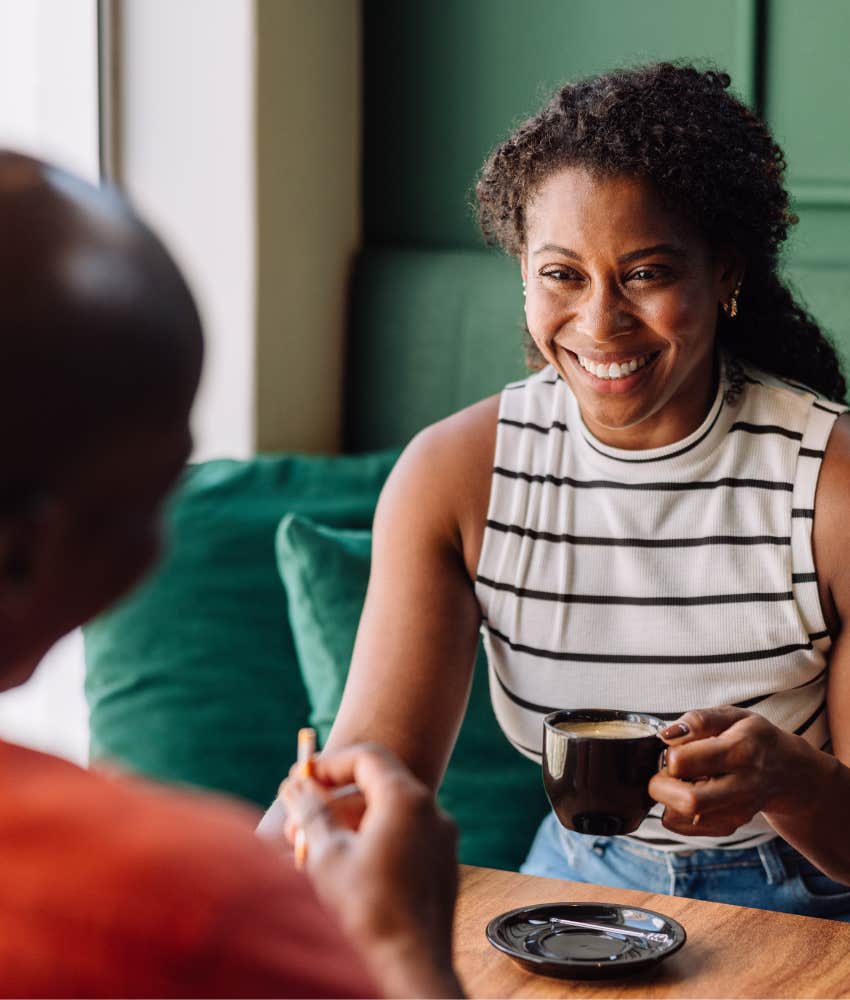The Art Of Being Secure: 5 Simple Habits Of People Who Aren't Frantic And Panicking About Being Loved
How secure people stay relaxed in relationships.
 marinasealovers | Shutterstock
marinasealovers | Shutterstock How can we nurture healthy and secure attachment styles if they weren't set in place during the first few years of development? How can we nurture healthy attachment if we did not have secure caregivers when we were young? How can we build awareness so our relationships benefit from secure attachments?
It really is incredible how the first few years of one’s life can have such a big influence on the rest of it. How a caregiver interacts with their infant can determine a great deal about how that individual will attach to humans they are in relationships with later in life. How can you develop a secure attachment style in your later years, even if that’s not where you started?
Here are 5 simple habits of people who aren't frantic and panicking about being loved:
1. They cultivate self-awareness
There are many reasons why our attachment might be anxious, ambivalent, or a combination of the two. You can find many attachment tests online, or if you've ever been in a relationship or two, you might be able to figure it out right here and now. The most important piece to take away from all this is that we are all capable of secure attachment — it is possible.
There are 4 types of attachment styles:
- Secure attachment: You can voice your needs and meet the needs of others in a relationship (romantic or otherwise). You are self-possessed and communicate easily. You are independent, but not headstrong. You do not panic when others leave you; you do not worry that they will leave forever. You feel safe, seen, and secure, and can trust, support, and attune to those you are in a relationship with.
- Ambivalent/Anxious attachment: You have a great need to be in a relationship with others. You are constantly seeking external reassurance, support, and care. You do not always know how to voice your needs. You may live in your head, not your heart, constantly worrying about when your partner will leave you, instead of truly trusting and engaging with them. You fear being alone, and you do not trust yourself to be able to self-soothe. You may resort to unhealthy means of coping. You may end up in multiple unhealthy relationships, searching for the "fantasy bond" that you never received as an infant.
- Avoidant attachment: You are isolated and distant. You may believe you are simply independent, but it has a self-destructive air to it — the illusion of independence. In order to get your needs met, you pretend you do not have any. You avoid commitment and may dissociate. You tend to be on the more depressive side of response to stimuli — you could take it or leave it, the less action, the better. Intimacy is a challenge. You may often end up in a relationship with those with anxious attachment, which is usually quite devastating to all parties.
- Disorganized/Anxious-Avoidant attachment: You likely endured some trauma in your early years. You never felt safe, so you do not feel safe in relationships. You do not know when someone is going to go, when someone is going to stay, or when something may happen to throw everything off balance. So your attachment bounces from anxious to avoidant daily. You do not know how to achieve safety and may end up putting yourself in dangerous situations.
Researchers studying close relationships "emphasized that attachment-anxious individuals are ambivalent in their relational tendencies, wishing to be close to their relationship partners but also fearing rejection." That all seems like a lot, but there is good news: no matter your attachment style up until this point, it is possible to become an adult with secure attachment, despite your age, relationship history, current relationship, or attachment.
Get to know yourself really well. This could be through journaling. Through answering random questionnaires on the internet, just for yourself. Through playing the question game with yourself. Through engaging your emotional and creative brain in more of the things you do. However, you connect with your inner self — do that. And do it more often.
2. They check in with people
 JLco Julia Amaral via Shutterstock
JLco Julia Amaral via Shutterstock
Therapist Diane Poole Heller, Ph.D., explained, "Often when we’re tired, stressed, or find ourselves in a particularly difficult relationship, we may default into insecure attachment patterns — such as finding ourselves withdrawn, disconnected, or being clingy, or feeling abandoned or unlovable. Understanding your relationship history and your attachment adaptations, along with other healing modalities, can help you enjoy more fun, fulfilling, and meaningful relationships, as well as enhance your capacity to explore the depths of intimacy and authenticity."
This is why it is important to check in with other people, which includes the people you feel safe with in your life. Check in about how they perceive your actions and how you perceive their actions. Chat about what works in your relationships and what doesn’t. This will help you to identify how to ameliorate your relationships, as well as shine light on what your needs are.
3. They communicate their needs
Once you’ve identified them, you can communicate them. It is not always easy. It takes practice. We are not encouraged to discuss our emotional needs in a straightforward way, so this might be uncomfortable. But the more you do it, the easier it gets.
"As with any work towards a healthy relationship," suggested life coach Lisa Lieberman-Wang, "these benefits will take you some effort to achieve. It can be tough to share your thoughts and feelings with complete honesty, especially with your partner whom you want to make happy. But, telling the truth isn't just a behavior; it’s a complete way of living and being in your relationship. And, the importance of communication with your partner can't be emphasized enough."
4. They pay pattention to patterns
 Josep Suria via Shutterstock
Josep Suria via Shutterstock
Are you often attracted to emotionally unavailable people? Or people who desperately need you? This could say just as much about you as about them. Start identifying similarities in your relationships and then reflect on them. Journal about it. Talk about it. Identifying it is the first step to changing it.
Divorce coach Karen Finn cautioned, "The tricky thing about emotional self-awareness is that most of us are on autopilot and don’t even know it. We lock in our thoughts, beliefs, habits, and behaviors early in life. And that kind of hardwiring is tough to rewire."
5. They know when to seek help
Our brains are mysterious places, and there is no shame in saying, "I just cannot figure this complex thing out; I need the assistance of an expert." This is powerful. This enables you to take control of your life back. We all need help in so many areas of our lives. Do not be afraid to ask for help.
You do not need to engage in traditional talk therapy, as I know that’s not everyone’s cup of tea. There are many beautiful kinds of guidance — movement and dance, creative expressive arts, spiritual guidance, and even tantric therapy.
Find what speaks to you, find who speaks to you, and work together to get yourself to a place where you feel safe, seen, and secure. Being a human is full of mystery, magic, and intrigue. And it is really hard sometimes.
The more we get to know ourselves — what makes us feel powerful, embodied, and shiny — the better we will be able to navigate these complex experiences while causing the least amount of harm.
Celeste Seiferling is a clinical counsellor, intimate health educator, mental health advocate, dancer, aerialist, and writer.

